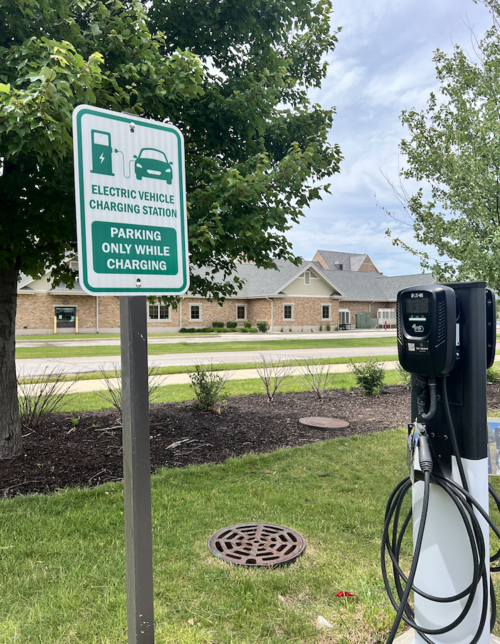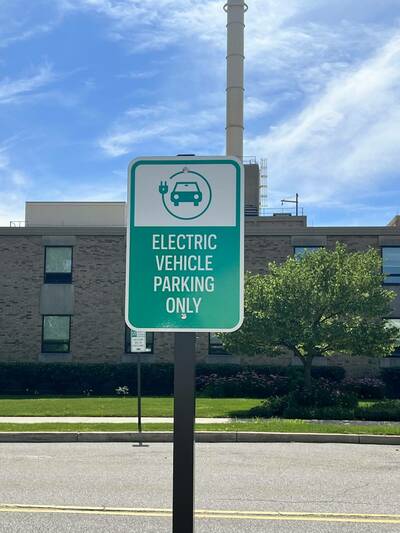Electric vehicles (EVs) have been at the forefront of conversations for campus operators over the last two years. As announced in February, Notre Dame brought its first EVs to campus to serve operational needs in Parking Services and motor pool rentals for University business. To build upon the programs that help us care for our common home while supporting commuter needs, Parking Services and Sustainability have collaborated to update the preferred parking program, and Utilities has worked tirelessly to bring more EV infrastructure to campus.
EV Charging Stations

Over the past year, the Utilities team has partnered with EV charging provider Eaton to update infrastructure, installing twelve stations throughout campus to allow commuters to charge their EVs. “The University has long enjoyed a close relationship with Eaton and appreciates their cooperation as it relates to EV charging stations and the associated software that will support the Utilities Department’s ability to track and learn more about EV usage on campus,” says Paul Kempf, Assistant Vice President for Utilities and Maintenance. Two more chargers are expected to be installed at the new Raclin Murphy Museum of Art in the coming year to support growing demand. Starting this academic year, Notre Dame will also pilot a charging station software program with Eaton, which will collect usage data to help Utilities troubleshoot station errors and better understand commuter needs.
As more of the campus community adopts EVs, keep in mind that charging stations are not to be treated as available parking spaces. Charging is limited to four hours within a 24-hour period of time, and charging locations should never be occupied by vehicles that do not require charging . Other EV charging rules are in place to maintain a successful EV program:
-
If the charging station is occupied, do not unplug another vehicle. Check back later for space availability.
-
Do not charge your vehicle if you do not need to. Please leave the spot available for another driver who may need to charge.
-
Prevent injury and damage by winding the charging cord neatly onto the station to keep off of the grass. This prevents the cord from being tripped on or run over by a lawn mower. The University does not have extra cords to immediately replace damaged ones.
Preferred Parking Program Transition

Moving in concert with automotive industry changes, an Electric Vehicle (EV) Preferred Parking program is replacing the Low Emissions Vehicle (LEV) Preferred Parking Program, which was discontinued as of July 1, 2024. The LEV program existed for over a decade to encourage the adoption of emerging vehicle classes with lower emissions. Transportation has rapidly evolved since the LEV program's inception in 2009, and the EV Preferred Parking Program accommodates the increase in EV commuting, and prioritizes vehicles that utilize electricity as the primary fuel source. Preferred parking spaces marked for LEV have been replaced with EV-preferred parking signs (left).
As was the case with the LEV program, EV drivers who would like to utilize the preferred parking spaces will be required to register their car to obtain a free decal. Parking Services will oversee the program. “We’re excited to support the growing community of EV commuters on campus,” says Olivia Rosenberg, Director of Administration for NDPD. “Alongside other campus partners, we’ve recognized the need to naturally evolve policies that align with the University’s sustainability goals.” Beginning in August, spaces will be monitored and enforced based on whether or not a vehicle parked in these spaces has a decal on the windshield. See the Parking Services website for details on registering your electric vehicle.
“EV adoption and commuter support are just one piece of the University’s larger greenhouse gas reduction strategy. Other commuting solutions are possible outside of EV adoption that can lower individual carbon emissions,” says Senior Director of Sustainability Geory Kurtzhals. “Still, supporting a reduction in vehicle-generated CO2 emissions contributes to improved air quality for our region and healthier Michiana citizens."
For more information on the EV Preferred Parking Program and charger locations, visit police.nd.edu/parking/ev. Individuals who experience charger problems or have concerns about inappropriate use of EV charging spaces should contact Parking Services via email at parking@nd.edu or via phone at 574-631-5053.